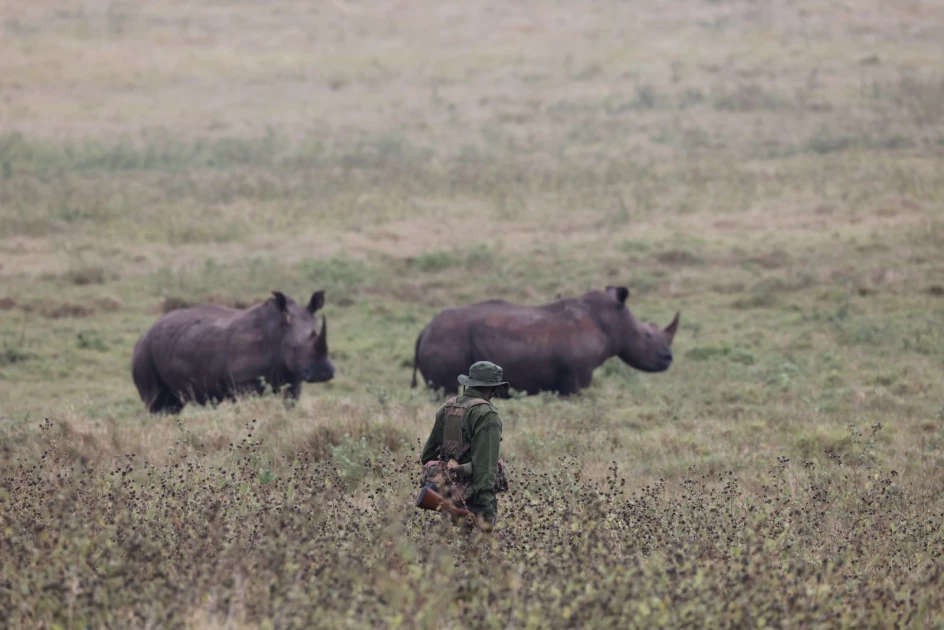WWF report reveals urgent action needed to combat wildlife decline in Africa

Ranger Kapuna Nanyuki is seen on duty at the Lewa Wildlife Conservancy in Meru County. | PHOTO: Agnes Oloo/Citizen Digital

Audio By Vocalize
According to the report, the world has experienced a decline of 73% with Africa’s at 76% in the size of monitored vertebrate wildlife populations between 1970 and 2020, driven primarily by habitat loss, overexploitation, pollution, and the impacts of climate change.
This alarming trend highlights the urgent need for transformative action to safeguard Africa's natural ecosystems and the livelihoods that depend on them.
Despite the alarming overall decline in species population shown in the Living Planet Index, the population of priority species in Kenya such as the African lion, the African elephant, and the black rhino have stabilized or increased as a result of effective conservation efforts.
The rebounding of the black rhino in Kenya, from the 400s individuals recorded in the 1980s to the current 1,004 in 2023 is a huge milestone for this critically endangered species.
However, the report warns that the continued degradation of ecosystems could push the continent past critical tipping points without immediate interventions. As ecosystems cross these thresholds, their ability to support both wildlife and sustainable development becomes compromised, with severe consequences for food security, water availability, and climate resilience.
Based on an examination of the science, the report underlines the urgency of the world in meeting global goals on nature, climate and sustainable development by 2030. To achieve this, it presents proven solutions to transform conservation and the energy, food and financial systems in a fair and inclusive way.
Mohamed Awer, Chief Executive Officer, WWF-Kenya, said: "Kenya is at the forefront of making significant contributions to fight climate change and restore nature, having committed to the Global Biodiversity Framework and the Paris Agreement among other global and national commitments. The country’s National Biodiversity Strategies and Action Plans (NBSAPS) make ambitious targets present a unique opportunity to mobilize capacity and financial resources in a coordinated manner to help restore ecosystems, enhance sustainable use of biological diversity and champion fair and equitable benefits sharing.
The redoubling of the nation’s ambition to the Bonn Challenge through the 15 billion commitment to restore 10.6 million hectares of degraded landscapes, is a step in the right direction.
The stabilizing populations of priority species offer a shimmer of hope that consistency in a truly whole-of-society approach and collaborative interventions will not only help save species from extinction but also ensure they thrive.
However, if we are to stop nature loss at the scale needed to avoid global and devastating tipping points, climate finance must flow from the global level to nations most affected for their effective implementation of national commitments and action plans, and to the grassroots to build the resilience of indigenous and local communities bearing the biggest brunt of nature loss and climate change.”
Jackson Kiplagat, Head of Conservation Programmes at WWF-Kenya, stated: “Flagship species such as the African lion, the African elephant, and the black rhino remain endangered but there is hope that the continued interventions by stakeholders will stop decline and stabilize their populations.
The rebounding of the black rhino in Kenya, from the 400s individuals recorded in the 1980s to the current 1,004 in 2023 is a huge milestone for this critically endangered species. This is a clear testament of the power of concerted abd consistent efforts by all stakeholders, from the global to the local level.
The implementation of targeted recovery and action plans will ensure that these species do not become extinct, but rather thrive.”
As part of addressing landscape degradation, WWF-Kenya announced the adoption of 25 hectares in Ngong Hills Forest to provide a site where corporates in Kenya can join the movement for large-scale forest restoration. corporate partners.
The conservation organization signed a framework of agreement with the Kenya Forest Service for the adoption of the degraded site for restore in partnership with the Ngong Hills Community Forest Association (Ngong CFA). Members of the Ngong CFA will tend planted tree seedlings for three years to ensure high survival rates.


Leave a Comment